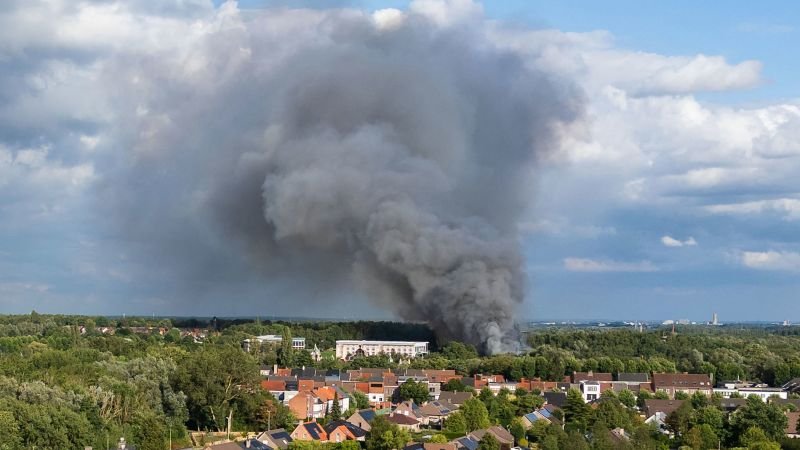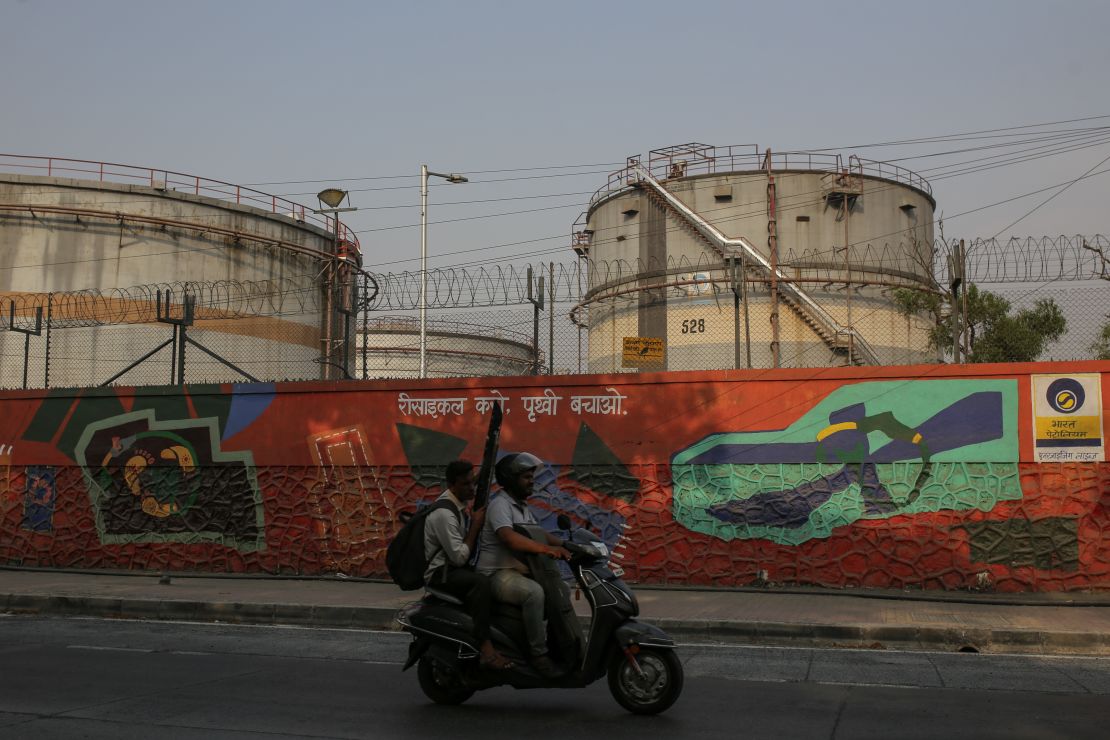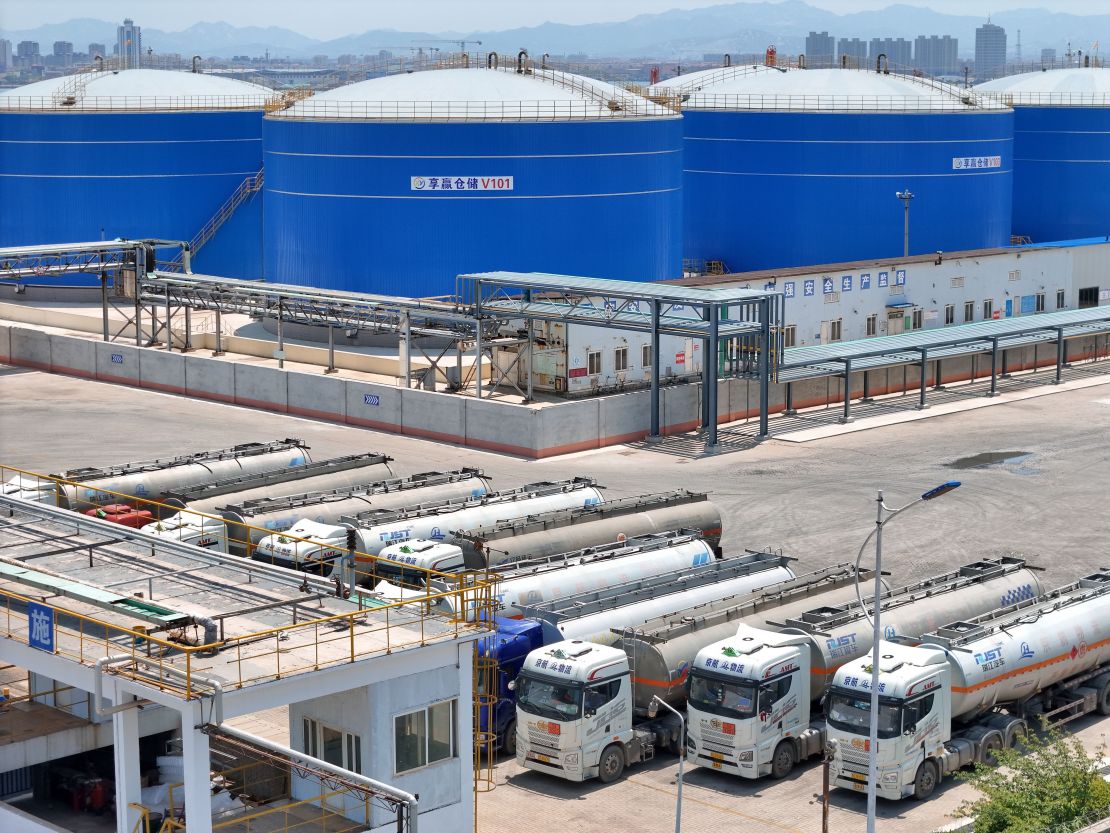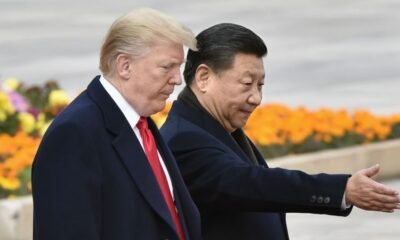Hong Kong
CNN
—
US President Donald Trump is trying again to end the war in Ukraine – not by targeting Russia, but by hitting the countries that buy Russia’s oil.
Top of that list? China and India, two of the world’s most important economies.
The US could slap those countries with economic penalties, Trump said, if Russia doesn’t agree to make peace within a 50-day limit.
That could roil not just two of Asia’s biggest markets but, by extension, the entire world, as India and China scramble to shore up supplies and find different oil sources – to avoid potentially hefty US tariffs or other sanctions.
Russia made about $192 billion last year from selling oil, according to the International Energy Agency. Cutting that off could be effective – but also expensive, and not just for Moscow. Oil prices could spike globally if Russia’s more than 7 million exported barrels of oil per day abruptly disappear.
Oil markets haven’t reacted much to Trump’s threat yet, largely because of uncertainty around whether Trump will follow through and, if so, how.
China on Tuesday also appeared unfazed. A spokesperson for its foreign ministry told reporters that “coercion” wouldn’t end conflict in Ukraine. India has yet to comment.
But using heavy tariffs to stop countries buying Russian oil would be a blunt tool – and while they could significantly squeeze Russia’s war funding, they could also unleash more havoc on the rest of the world.
In the wake of Russian President Vladimir Putin’s invasion of Ukraine, the US, United Kingdom and European Union threw up import bans and price caps on Russian oil. But Russia’s exporters adapted quickly, rerouting the flow of the country’s vast supplies from West to East, where buyers, especially in China and India, significantly stepped up purchases of discounted fuel.
Three and a half years later, the war is grinding on. Trump, back in the White House for six months, is increasingly frustrated with Putin’s apparent disinterest in peace.
A bipartisan bill to let Trump tariff countries buying Russian energy or uranium at 500% had been gaining momentum in the Senate. Supporting lawmakers called the bill the “sledgehammer” Trump needs to end the war.
On Monday, Trump announced his own plan, saying the US was going to be doing “secondary tariffs,” with a White House official clarifying to CNN that Trump meant secondary sanctions on other countries that buy Russian oil.
“They’re secondary sanctions. It’s sanctions on countries that are buying the oil from Russia. So it’s really not about sanctioning Russia,” Matt Whitaker, the US ambassador to NATO, told CNN that day at the White House. “It’s about tariffs on countries like India and China that are buying their oil. It really is going to dramatically impact the Russian economy.”
Secondary tariffs, which experts say could mean broadly imposing duties across a countries’ exports to the US, would be a relatively new tool that could give India and China strong financial incentives to stop buy Russian oil, if it appears imminent. Both countries have already been in separate trade talks with the US to negotiate down other Trump-imposed levies.
“It’s the strongest possible card from an energy perspective, at least, that the allies of Ukraine can play,” Ben McWilliams, an affiliate fellow in Energy and Climate Policy at Brussels think tank Bruegel, said of targeting Russian oil exports. “But there’s a question – even once they’ve been implemented, how serious is the US about enforcement?”
But playing that strong card would come with consequences, ones that Trump might not be prepared to accept, analysts say.
For one, the volumes at stake – and that could need to be replaced – are huge.
Russian crude accounts for 36% of India’s imports, and nearly a fifth of China’s, making Russia both countries’ top supplier, according to Muyu Xu, a senior oil analyst at trade intelligence firm Kpler, citing figures for the first six months of this year, which include estimates on how much China received via pipeline.
Turkey clocks in as a distant third to those two buyers, but is a key purchaser of oil products, according to the Europe-based nonprofit Center for Research on Energy and Clean Air (CREA). Russian crude also flows to Hungary and Slovakia via pipeline under an EU exemption, the center’s data show.
“If nobody is buying Russian oil, then where can we find the supplement? OPEC has some spare capacity, but it’s difficult to ask them to pump 3.4 million barrels overnight,” said Kpler’s Xu, referring to Russia’s daily seaborne exports. “It’s just difficult to make up the market share … so we’re definitely going to see the prices go up quite a lot.”
And while that could pressure Putin, it would also pressure Trump.
“We all know that Trump dislikes high oil prices, and this is what makes this so complicated … because there is limited spare capacity, and there is limited way to compensate if there is a large disruption,” said commodity analyst Giovanni Staunovo at UBS in Zurich. “It doesn’t fit into the agenda of low oil prices.”
Limits on current spare capacity and reserves, as well as a lead time of months or years to bring more production capacity online, could make it hard to keep oil prices low, he added.
That said, the US could extend deadlines to buy time for more supplies – and sweeping tariffs may only be one tool in the Trump administration’s kit.
The president’s advisors were likely providing him “with a range of options that would include different forms of sanctions, including financial sanctions, as well as tariffs,” according to Gregory Shaffer, a professor of international law at Georgetown University.
Those could include more traditional US uses of secondary sanctions, such as targeting entities or individuals from other countries involved in the Russian oil trade, or even expanding those sanctions to have a broader set of penalties, for example on securities trading or access to American technologies in a Russian oil-purchasing countries, he said.
Already the Biden administration earlier this year imposed the harshest sanctions to date on Russia’s oil industry, blacklisting two of its largest oil companies as well as nearly 200 oil-carrying vessels.
A narrower sanctions approach than tariffs could be a more practical option, which could still have a sizable impact of disincentivizing players from the trade – if tightly enforced, experts say.
“The likelihood is that (secondary tariffs are) too disruptive for Trump to be willing to use,” according to Richard Bronze, head of geopolitics at London-based consultancy Energy Aspects. “There’s a higher chance that he’d end up using secondary sanctions, which are a more kind of targeted and well-understood tool.”
Bronze noted Trump has already issued an executive order allowing a tariff of 25% on goods from countries buying Venezuelan oil in March, but that the US president “hasn’t taken any action to impose that.”
The threatened penalties appear to have two goals: signal to Russia that it could be starved of profits and use its trading partners to ratchet up pressure.
NATO chief Mark Rutte on Wednesday called on China, India and Brazil to “please make the phone call to Vladimir Putin and tell him that he has to get serious about peace talks.” Otherwise, Trump’s measures “will slam back” on them, he said. (Brazil accounted for about 12% of purchases of Russian oil products last month, according to CREA.
But while observers say a cash-strapped Moscow is closely watching this threat, Beijing and New Delhi are unlikely to want to press Putin or change course until they are absolutely sure how real Trump’s threats are. Both countries have deep strategic ties with Russia and have defended their trade in the face of accusations they are funding the war – a conflict in which both claim to have not chosen sides.
Given the scale of its Russian crude purchases, Beijing has room to barter with Trump and reduce its imports, but that won’t change China’s approach to Russia, according to Yun Sun, director of the China program at the Stimson Center think tank in Washington. “I don’t think China will be putting pressure on Russia, at least not because of US pressure” at this point, she said.
China is also used to the US looking the other way as it imports significant volumes of sanctioned Iranian oil via intermediaries.
And for India at present, the country “sees no value in giving in to US pressure on Russian oil,” said Ajay Srivastava, founder of the India-based Global Trade Research Initiative. He noted that this is just one of a list of present and future “unpredictable US demands” and shouldn’t change India’s “strategic decisions.”
Trump’s own interests in maintaining trade with these major economies is one more reason for questions about whether and what measures will ultimately come to pass.
“This (tariff threat) may be more symbolic,” said Georgetown’s Shaffer. But when it comes to the US signaling on its position on the war in Ukraine, he added, “the symbolism matters.”




























